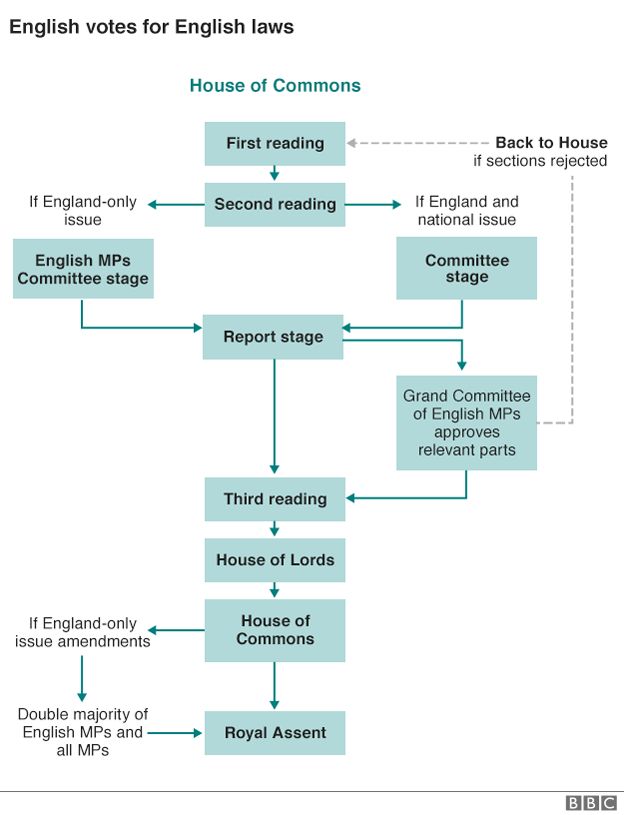BBC News
Notice anything missing? Like, you know, any clear direction on what constitutes an English-only issue or a process by which Scottish or Welsh MPs can challenge the Speaker's decision?Plans to introduce "English votes for English laws" for MPs have been voted through in the House of Commons.
The government won the backing of MPs by 312 to 270 votes. A series of amendments by Lib Dem and Labour MPs were also defeated.
Commons leader Chris Grayling dismissed objections to the new law as "nonsense" during a bad-tempered debate.
The SNP's Pete Wishart said the "stupid" plans would make Scottish MPs "second class citizens".
How it will work
There will now be a new stage added to the usual law-making process at Westminster allowing MPs for English constituencies to vote on issues deemed to only affect England.
These MPs would be able to veto the legislation before all MPs from across the United Kingdom voted in the bill's final readings.
Speaker John Bercow will decide whether a Bill only affects England, and all MPs in the Commons will still have to pass legislation at other stages of the process.
The Speaker will be able to explain his reason for certifying an issue as English or English and Welsh only and call on two senior MPs to help make the ruling.
What the government says
The idea is to eliminate the anomaly where Scottish MPs in Westminster can vote on matters such as health or education in England, but English MPs cannot do likewise on issues devolved to the Scottish Parliament. This is known as the West Lothian question and has tormented MPs for decades.
Mr Grayling told MPs: "These proposed changes enable us to give an answer to the West Lothian question, they enable us to give an answer to our constituents, to say England will have its own piece of our devolution settlement."
He rejected as "nonsense" claims that it would create "two classes of MPs" adding that the measures were "fair, sensible and I'm entirely comfortable as a unionist presenting them to this House".
He added: "It can't be in anyone's interest to see English people becoming cynical about the union... it isn't tenable to have devolution for Scotland, Wales and Northern Ireland and for England to have no powers at all."
What the SNP, Labour and other parties said
The SNP's Pete Wishart told MPs: "Scotland is watching this and the mood is darkening. If this is an exercise in saving the Union you could not have contrived of a more inept way to save the Union.
"Support for independence is actually increasing."
Labour's Chris Bryant said Mr Grayling's plans were so complicated that they resembled a "bowl of soggy, overcooked spaghetti" and claimed they would hasten the break up of the United Kingdom.
Labour backs "an English voice in Parliament" but does not want "an English veto," which would set England against Scotland.
DUP leader Nigel Dodds said: "The proposals neither deal with the problem they diagnose" and threatens the "fabric of our union".
Lib Dem Alistair Carmichael said the government "was still inviting" MPs "to do the wrong thing".
Conservative MPs happy
Heather Wheeler, Conservative MP for South Derbyshire, said she was "delighted" the plans are being introduced - telling MPs it is a matter of utmost importance to her constituents who object to MPs from devolved nations voting on England-only matters.
Senior Conservative MP John Redwood, who wants an English Parliament, backed the "very mild and moderate" proposals which he said would "start to put right some of the injustice to England".
He said English MPs had "always been at the bottom of the heap" and that it was wrong that Scottish MPs could vote on matters in his constituency, such as hospitals and schools, but that he didn't have the right to vote on these matters in Scotland.
Why it matters
When Scotland voted last year to remain part of the UK, David Cameron promised significantly increased powers for the Scottish Parliament, including the ability to set some tax and benefit levels.
At the same time, he promised English MPs they would get more power too - they would be able to legislate in areas such as health and education without any input from MPs representing Scottish seats.
Getting the balance of power between the different legislative bodies right is seen as important to the future of the UK.
If the Westminster Parliament is going to have any authority, voters from all parts of the country must feel they are being fairly represented.
